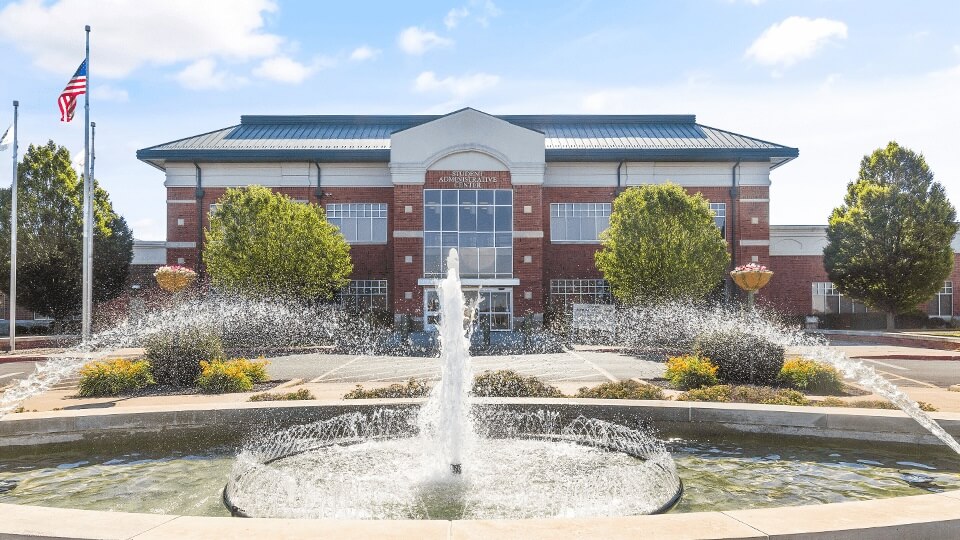

The John Wood Community College Board of Trustees, meeting in regular session in Quincy Wednesday, November 13, heard a report about the College’s retention rates outperforming similar sized community colleges across the country.
Rob Hodgson, JWCC director of support services, and Andrew Happekotte, director of advising and retention, shared full-time, part-time and fall semester retention data with Trustees. During the first 10 days of the 2019 fall semester, JWCC retained 96 percent of all credit hours in which students enrolled. The percentage is the highest JWCC has achieved in the last four years.
Data from the National Center for Education Statistics (NCES) from 2018 shows that JWCC retained 66 percent of first-time, full-time students and 53 percent of first-time, part-time students from fall 2016 to fall 2017. The same report indicates that JWCC outperformed 28 other similar sized community colleges from across the country that averaged 61 percent full-time and 36 percent part-time retention rates during the same period.
Hodgson and Happekotte cited several factors that have led to JWCC’s retention success. The College uses Starfish Retention software that connects faculty, advising and support services personnel to communicate concerns that may become obstacles for students’ success. Admissions and advising personnel now share an office space and have enhanced key processes to streamline services. JWCC employs a full-time counselor to support students’ emotional needs and a Rescue Center is in operation during the first two weeks of each semester to provide extra assistance.
“Retention of students is as important as recruiting new students and is a huge reason why the College has been able to achieve enrollment growth in the last few years,” Michael Elbe, JWCC president said. “Continuing students account for nearly 40 percent of our total enrollment and when we provide the right people, programs and services to support students on their educational journey from semester to semester, they have the best chance for success, which is our number one strategic goal. The collaborative and creative efforts of our faculty and staff are making a difference.”
In other business, the board:
Proposed a portion of the total 2019 tax rate. The total expected tax rate for 2019, which will be considered for approval in December, will remain the same as 2018 at $0.42400 per $100 Equalized Assessed Valuation (EAV) and result in a $7,536,600 levy. Due to increases in some property values, the 2019 levy is estimated to generate $377,368 more than the 2018. The portion of the rate proposed at the meeting was $0.36912 of the $0.42400. Funds from the 2019 levy will be distributed to the College in the 2020-21 fiscal year.
Voted to reject all bids for a geothermal heating and cooling trainer for the College’s HVAC program. Specifications for the equipment need to be changed and the College will rebid the project at a later date.
Authorized submission of a $50,000 to $75,000 application for an Illinois Community College Board Innovation Bridge and Transition grant. If received, the grant would fund initiatives to place JWCC College for Life students in internships and provide services to help Quincy Area Vocational Technical Center students transition into college or career training.
Accepted a $39,804 grant from the Illinois Green Economy Network (IGEN) is to add a solar heat and photovoltaic training unit to complement the College’s new HVAC program.
Accepted a $200,000 grant from to IGEN as part of a Lower Illinois River Valley Prosperity Initiative collaborative with Lewis and Clark Community College (LCCC), Illinois Electric Cooperative, Pike-Scott Farm Bureau, University of Illinois Extension, and Great Rivers Land Trust. The collaborative seeks to explore the potential for employing next generation technologies and best management practices to improve water-energy usage on agricultural lands in the JWCC and LCCC adjoining districts. Development and use of research data from the project may be used for community information seminars, future curriculum development and agriculture or energy conservation training applications.
Approved regular meetings for trustees in 2020.
The next meeting will be held Wednesday, December 11, at 7 p.m. in Quincy.